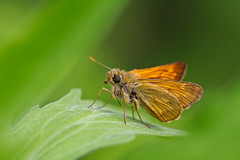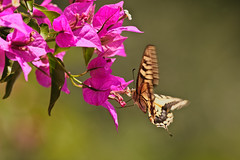Before I start a post where it seems like I'm bashing the 180mm macro let me start out by saying that it's an awesome lens from a technical point of view -great color, contrast, and plenty sharp. So no angry letters please :) But it does have some "limitations" that you need to be aware of...
All too often I hear people say that for bug photography you need a lot of working distance to keep from scaring the critters, and so a long focal length lens is a good choice. More experienced macro shooters either know how to get close to skittish subjects, or they know when to go looking for them when they are not so active (late evening / early morning) so working distance is a non issue. You can, with practice, get close to just about anything.
Canon 65mm F2.8 macro lens at almost 4x. Single frame (I don't focus stack).

For flash photography the increased working distance of a long lens works against you. Due to the Apparent Light Size Principle it's easier to get good diffusion the closer your diffuser is to the subject. But if you get your flash out past the end of the lens then you've just lost the gain in working distance that comes with long glass. I took most of my macro shots with the 180 L using either natural light, or a mix of natural light and flash.

For shooting closeups the 180 L just doesn't have the "reach" of a long prime like the 300mm L, and hard to reach subjects were impossible to shoot at the magnifications that I wanted to shoot them at. Also keep in mind that, shooting the same scene, the bokeh with the 300mm L (or any long focal length prime) is going to be better than the bokeh of the 180mm L because there is more distance between the lens and the subject with longer glass (so more distance between the lens and the background as well).
180mm F3.5 L

300mm F4 L (taken in the middle of the day so the light is pretty harsh)

I know this is gonna sound kinda of odd coming from a macro shooter, but I just can't recommend a long focal length macro lens. They don't work well for macro unless you want to use natural light and a tripod, and they just don't have the reach and bokeh of a long focal length prime. I currently carry a Canon MPE-65mm macro lens and the 300mm F4 L and those two cover all of the macro and closeup shooting that I do.

5 comments:
Thank you very much for some important thoughts about this, I have a upcoming flower project and some wildlife near my home (like monkeys and coyotes) and wanted a longer lens for occasional shooting of the animals and compressed perspective of flowers.
Your insight is very important.
Nice to hear somebody else talking about working distance being a non-issue for insect macrophotography. I too have come to learn that I can get as close as I need to to almost any subject I wish to photograph by understanding its behavior and 'working' the subject for long enough. The gains in lighting quality from large apparent light size far outweigh the ease of longer working distances. I have even started using using extenders on my 100mm macro (I need less than 1X for some of my subjects), at least in part, to decrease the working distance and get better light diffusion.
Good luck with your project gmazza!
You're absolutely right Ted -the more you learn about the habits and quirks of the subjects you shoot the easier it is to get close to them.
I was very confused about which macro focal length to pick. It's all clear know, thank you for this great article.
Mustafa
Thank you for this great article.
Very well written and precises.
Post a Comment